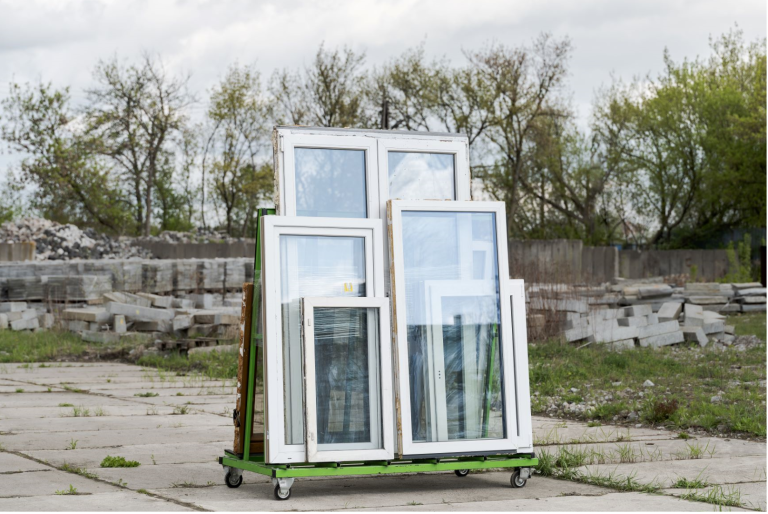RE-PVC-U Material Reuse and Social Engagement in Architecture
03 June 2023, 1:00 pm–4:00 pm

Curators of the Polish Pavilion at London Design Biennale will be in conversation with Michał Murawski about material reuse in contemporary architectural practices. The panel discussion will explore the forces behind the pavilion concept and the reuse of building materials in times of crisis, and how it can influence the future of architecture.
Event Information
Open to
- All
Availability
- Yes
Organiser
-
The Bartlett School of Architecture
Location
-
6.02The Bartlett School of Architecture22 Gordon StreetLondonWC1H 0QB
Schedule
Saturday 03 June | 13:00 - 16:00
Panellist: Zofia Jaworowska, Petro Vladimirov, Michał Sikorski and Michał Murawski
Abstract
If we can scale up the use of reclaimed materials in architecture, what will it look like? Noble and natural materials such as stone and wood have been reused since time immemorial. What if the catalogue of reclaimed materials also included the synthetic and cheap ones? How can we tap into the social and environmental potential of material reuse? What is architecture’s answer to crises and what form does it take? Has the concept of comfort changed in recent years? If so, how should we be building and rebuilding to integrate that change?
We invite you to a panel discussion with the curators of the Polish Pavilion at London Design Biennale about material reuse in contemporary architectural practices and socially engaged projects. The exhibition prepared by the Polish team and organized by the Adam Mickiewicz Institute at LDB entitled ‘Poetics of Necessity’ stems from the WINDOW project, which called on Poles to donate reclaimed windows to Ukrainians stripped of dignified living conditions as a result of war. It explores how crisis collaboration influences the aesthetics and durability of the proposed solutions and tells the story of the people and processes behind the journey of thousands of windows across Europe.
Curators of the Polish Pavilion, activist Zofia Jaworowska, architect Michał Sikorski, and artist Petro Vladimirov will be in conversation with anthropologist of architecture Michał Murawski (UCL, SSEES) and will explore the forces behind the pavilion concept, the role of social engagement and the reuse of building materials in times of crisis, and how it can influence the future of architecture and the building sector.
Biographies
Zofia Jaworowska is an activist and founder of the BRDA Foundation. When the war in Ukraine began, she launched Grupa Zasoby, a grassroots initiative dedicated to finding shelter for thousands of refugees arriving in Poland. For many years, she worked in the film industry and non-profit sector. She currently combines that creative experience and social engagement in projects dedicated to housing and material reuse.
Petro Vladimirov is an architect and curator with a background in the arts. He gained professional experience in the Henning Larsen architecture office in Denmark before working as a product designer for real estate development. Together with the BRDA Foundation, he co-created the WINDOW project. He initiated and participated in numerous multidisciplinary projects throughout Europe – the most recent one, Ukraine Reconstruction Office, at the Museum of Warsaw.
Michał Sikorski is an architect and urban planner with a background in campus planning and research. Before founding TŁO, his own practice in Warsaw, for a decade he collaborated with the Belgian architect Xaveer de Geyter on the Paris-Saclay science cluster master plan. Later, he was the architect in charge of the University of Warsaw planning and co- authored a monograph on the topic. He taught architectural and urban design at ETH Zürich and the Warsaw Technical University.
Michał Murawski is an anthropologist of architecture and cities, Associate Professor of Critical Area Studies at the School of Slavonic and East European Studies, University College London. His first book, The Palace Complex: A Stalinist Skyscraper, Capitalist Warsaw and a City Transfixed was published by Indiana University Press in 2019; and he is currently completing his second book, a critical study of politics and architecture in post-Soviet Russia. He is Director of the UCL SSEES FRINGE Centre for the Study of Social and Cultural Complexity; and founding convenor of PPV (Perverting the Power Vertical: Politics and Aesthetics in the Global East), a seminar and events platform based at UCL.
Image: Fundacja BRDA
 Close
Close

